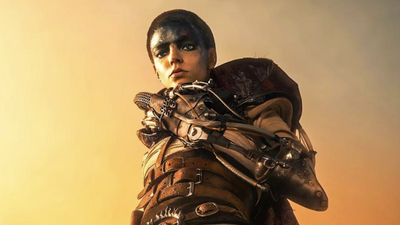There’s also a Max-like figure played by Tom Burke who becomes important for a couple of chapters and whose bond with Furiosa is fascinatingly portrayed as something more akin to a couple of pack animals bonding than as a couple of human lovers. Of course, he dies a gruesome death. There are a lot of gruesome deaths in this film, and they seem even uglier than in previous films. I’m far from the first writer ruminating on the “Mad Max” films to invoke Thomas Hobbes’s description in “Leviathan” of human life in a state of nature as being “solitary, poor, nasty, brutish, and short.” But did ever I feel it in my bones this time, even more so than in any other movie in the series.
Miller and cowriter Nico Lathouris have complicated the “Mad Max” world in much the same way that George Lucas complicated the universe of “Star Wars” in the first prequel trilogy. Both replaced a streamlined, simplistic “These are the good guys, and these people over here are the bad guys” diorama with an elaborately embroidered tapestry of government and economics. After all, the main villain was a career politician who understood the intricacies of the system better than anyone else.
The main antagonist in “Furiosa,” Chris Hemsworth’s Dementus, is not a grand monstrosity like Immortan Joe in “Fury Road” or even Humungus in “The Road Warrior (aka “Mad Max 2”). Instead, he’s a demonic clown with a philosophical streak and, it appears at times, a lot of self-loathing (which doesn’t announce itself except when he’s committing the most exceptionally brutal acts). He’s an instigator, hustler, and double-crosser, practically the post-apocalyptic version of a figure out of a Sergio Leone Western. He pushes other characters’ buttons and promises riches and power mainly so that he can get the things he wants. He’s a monologist/pontificator. He dreams of being a grand monster, a philosopher-king of the wasteland. But he’s not there yet. And as the years stretch out and he continues to be a bit of an also-ran—grumbled about and even openly mocked by others when he’s not looming in their faces—you start to feel the weight of his thwarted ambitions. Dementus hates that he hasn’t gotten to where he thinks he deserves to be.
Perhaps more so than any other “Max” movie, “Furiosa” gives you a strong sense of how much work it must be to succeed as a despot when society has crumbled. There are multiple bad guy-coded characters in “Furiosa”—Dementus plus the heads of the Citadel, the Bullet Farm, and Gas Town and also Octoboss, who gets tired of Dementus’ erratic leadership and goes rogue in one of the chapters—but none of them feel like a video game Big Bad this time. The scale of the production is as immense as in “Fury Road,” but everything feels shabbier. You also get a keener sense of how cult behavior is manufactured to provide an army of uncompensated laborers who are there because they believe in a cause, however self-contradictory and dumb it might seem. The War Boys, in particular, are lemmings who will leap to their deaths when commanded.

